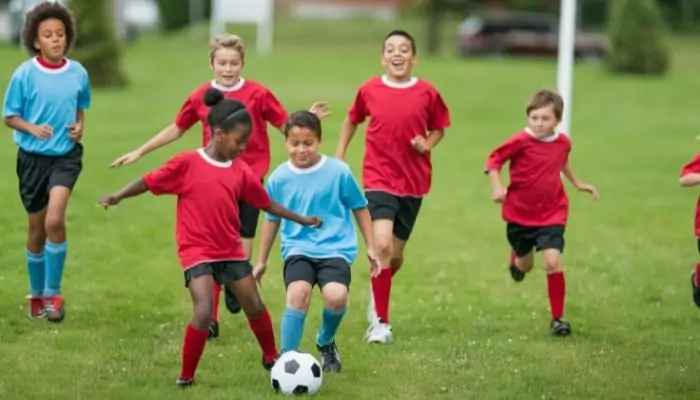Should I Force My Child to Play Sports?

This post may contain affiliate links. If you buy through the link, I may earn a commission. Learn More.
We have a rule in my house: Everyone must be involved in a sport or physical activity. What sport that is doesn’t matter. We simply want them to always be active and healthy.
Encouraging exercise while they are young is hopefully something they will carry with them into the future.
*FYI, some of the links in this article about should you force your child to play sports may be affiliate links. If you click and make a purchase, we may get a commission (at no extra cost to you). For more info, please see our disclaimer.
Should You Force Your Child to Play Sports?
You should encourage your child to play sports. Exercise is proven to increase physical, mental, and emotional health among children. Children who engage in exercise regularly are less likely to develop chronic illnesses and more likely to perform better in school.
I think it goes without saying that physical activity is, without a doubt, vital to a healthy life.
How to Navigate Parenting a Child in Sports
There are no medical professionals who advise against exercise. Unless a child has an illness or disability that prevents them from engaging in physical activity, exercise is highly encouraged. Encouraging a child to be active is as important to a healthy lifestyle as eating well and getting enough sleep.
My children have been in sports for as long as they can remember. Part of that is because of their parents. I was never very athletically coordinated, but I have always loved exercise. I play tennis, I run road races, and I’m a certified yogi. My husband was captain of his high school basketball team and quarterback in football.
With that in mind, we always agreed that our children would have to be active. However, we both agree that one of the biggest mistakes parents make is trying to live through their children.
We promised each other that we would never force our children to play a specific sport, just that they had to be involved in something that kept their bodies moving.
How to Handle a Child Who Doesn’t Want to Play Sports
So you have a child that doesn’t want to play sports. It’s tough to sell a child on sports if they haven’t started young. The best thing to do is to start a child on sports as soon as they are able. Many places have toddler programs in gymnastics, dance, or even soccer.
If you are already past that age, you still have some options. First, help your child realize that “sports” doesn’t have to mean a Little League coach screaming in their ear.
There is a big, wide world of sporting activities out there. They can try karate, golf, cross country, swimming, or any number of other sports that are both competitive and fun.
I have a friend whose daughter became a champion in racewalking. Another friend’s child is heavily involved in horseback riding. Sports are multifaceted and very fulfilling if you can find the right one.
Second, try to find a friend to join along with your child. Having time to socialize is the best part of exercising for a lot of children. Children are much more likely to be excited about sports if they know they are going to get to spend more time with their friends.
How to Choose the Right Sport for Your Child

My kids have tried nearly everything. We started my son in soccer, which he hated. He then tried baseball, which he also hated. We enrolled him in gymnastics, swimming, tennis, and basketball. No, no, no, and no.
We didn’t mind him trying different sports; we only required that he stick through his commitment with each one before he moved on.
The one sport I was most strongly against was football. There are too many football injuries. I’m just not comfortable with it. However, when he lobbied to try flag football, I relented.
Unfortunately for me, he fell in love with the sport, and it became his passion. That nine-year-old playing flag football is now a 15-year-old varsity linebacker. I never wanted him to play football, but I did want him to find something he loved.
My daughter went in a different direction. Our next-door neighbor had a daughter who was trying dance and asked if our daughter would like to try it out too. She was three years old at the time. We thought it would be adorable.
We had no idea she would fall in love. We enrolled her in soccer, baseball, basketball, and track. In her eyes, none of them held a candle to dance. Now at age 11, she has been on a competitive dance team for five years.
It’s not the sport I would have picked or even considered, but it keeps her physically active and very happy.
Choosing the “right” sport doesn’t mean picking the sport that you love the most. It means letting your child choose the one that works for them. Whether that means bowling, lacrosse, or tae kwon do, this truly is an area where your child should take the lead.
The Strange Competitiveness of Youth Sports

There is a certain stigma attached to youth sports, and for good reason. We have been involved in enough sports now to know that coaches and parents can get far too aggressive under the guise of competition.
If at any moment, you feel your child is being mistreated, you should not feel a bit bad about pulling them from that league and finding an alternative.
The other issue is the amount of practice that goes into a competitive sport. Before I knew what I know now, I thought a sport would take about 5-7 hours per week of practice. Not true.
Both of my children average about 15-20 hours per week each in their respective sports. My son now has a broken elbow (thank you, football!) and still goes to team practices every day. In order to be competitive, this kind of dedication is required.
It’s a difficult decision as a parent. Do I let my child spend so much time on a sport, or do I say enough is enough? Frankly, I think it depends on the child.
If the child is miserable in long hours of practice, they should take a step back. If they are happy and still able to keep their grades and social lives in check, the long hours of practice are fine.
The Benefits of Sports
Children who participate in sports are shown to have better grades and stronger peer relationships than those who don’t. Being in a sport is an extremely positive thing for children.
Do you agree or disagree? Please share your thoughts with us in the comments.
